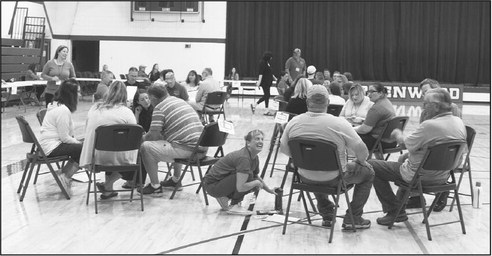not accept help from other ….


not accept help from other people. We have hundreds of backpacks here waiting to get out to families who need them, but they don’t ask for them because they are too proud to ask. Our free and reduced lunch program numbers are around 50 percent. A large number of our kids are living in poverty and there is too much pride for them to fill out an application because they think they have to do this on their own.”
At the end of the simulation, the teachers sat in groups together to discuss what they learned and experienced. They spoke about their difficulties in getting a job, getting their kids to school, making an income and how living a life of poverty influences your decision making.
“I learned about things that can affect education,” said elementary administrative assistant Becky Kohnert. “Weather, it can be a strong factor. In the winter, you can’t get evicted, but in the summer you can. Your kids, are they old enough to not need supervising or are they young and in need of daycare that you can’t afford? Those things can affect how you live.”
When they began to go over their feelings of failure and frustration at the simulation, Lewis-Pankratz talked to the teachers about the differences between those living in poverty and those in the middle class. Based on their experiences, she said both groups will react to the same scenario in a different way, which can be hard for someone higher up on the social chain to understand.
“Families who experience poverty make a lot of decisions that make sense to them but don’t make sense to the middle class,” she said. “People who live in poverty are wired by relationships. The middle class is wired to focus on achievement and getting better ... When you did this (simulation) what turned out to be your greatest resource? Your greatest resource lies in the middle, it lies in each other.”
Instead of focusing on trying to get these students to achieve according to middle class standards, Lewis-Pankratz said teachers should focus on meeting students where they are at and focus first on building up those relationships that they value.
“These families have trauma in their lives,” she said. “They are overworked, always in a fight or flight response ... What you must understand in working with kids living in poverty is that in order to get achievement you must build relationships first. Use the relationship to draw them in and build trust. If you do that, they will achieve for you.”
Going over the resources that families in poverty have at their disposal, Lewis-Pankratz said teachers probably have the best chance to cause change in a child’s life. But for those teachers who are uninformed about how to reach these kids, she said they will write them off as unreachable and that can negatively impact a child for years.
“Teachers are powerful,” she said. “They are agents of change in the lives of these kids. One thing I often hear is ‘I never realized why families were blowing me off and their kid’s education.’ Families experiencing poverty are very smart and capable. These kids are helping out at home and the parents are doing everything they can to make money to keep the lights on. And we label these kids as lazy or irresponsible.”
At one point, Green stressed to the teachers the importance of taking the lessons they learned in the simulation out into the workplace when the school year starts.
“Use that network,” he said. “Take the opportunity to build relationships with these kids. There are going to be some kids that will be coming back for the first time since the pandemic. You may be starting over with some of these kids. But this is the only way that we can connect.”
While teachers and schools have a big impact on families living in poverty, Lewis-Pankratz said that is not the only place such change can occur. The community itself can be a great resource to people living in poverty, and it is up to those individuals living in the community to decide to help and work to make a difference. If more people put in an effort to help the poor around them, she said so many lives could be changed for the better.
“We can get local people out of poverty,” she said “In school, teachers can provide support, but if we work together in our small towns we can get people out of poverty. These kids need us, these families need us.”
Greenwood School District staff members work in family units to talk about their assigned problems with poverty and steps they can take to cope. The exercise was designed to inform staff members of problems children may face in school due to financial situations at home.
CONTRIBUTED PHOTO
